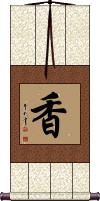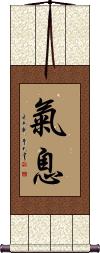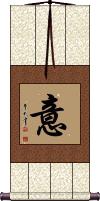Many custom options...
And formats...

Smell in Chinese / Japanese...
Buy a Smell calligraphy wall scroll here!
Personalize your custom “Smell” project by clicking the button next to your favorite “Smell” title below...
Fragrant / Good Smell
香 is the Chinese, Japanese Kanji, and old Korean Hanja that means: fragrant; sweet smelling; aromatic; savory; appetizing; perfume; incense; aroma; fragrance; scent; good smell.
Fragrance or incense is known to be one of the Buddha's messengers to stimulate faith and devotion.
Breath of Life
Idea / Thought / Meaning
意 is the Chinese, Japanese Kanji, and old Korean Hanja for an idea, intention, meaning, thought, wish, desire, intention, feelings, and thoughts.
In Buddhism, this is the last of the six means of perception (the others are sight, hearing, smell, taste, and touch, and this one represents the mind). It does not literally mean “mind,” but rather something more like mental powers, intellect, intelligence, faculty of thought, or understanding in the Buddhist context.
Not the results for smell that you were looking for?
Below are some entries from our dictionary that may match your smell search...
| Characters If shown, 2nd row is Simp. Chinese |
Pronunciation Romanization |
Simple Dictionary Definition |
意 see styles |
yì yi4 i i い |
More info & calligraphy: Idea / Thought / Meaning(1) feelings; thoughts; (2) meaning; (personal name) Kokoro Manas, the sixth of the ṣaḍāyatanas or six means of perception, i.e. sight, hearing, smell, taste, touch, and mind. Manas means "mind (in its widest sense as applied to all the mental powers), intellect, intelligence, understanding, perception, sense, conscience, will". M.W. It is "the intellectual function of consciousness", Keith. In Chinese it connotes thought, idea, intention, meaning, will; but in Buddhist terminology its distinctive meaning is mind, or the faculty of thought. |
氣 气 see styles |
qì qi4 ch`i chi ki き |
More info & calligraphy: Life Energy / Spiritual Energy(out-dated kanji) (1) spirit; mind; heart; (2) nature; disposition; (3) motivation; intention; (4) mood; feelings; (5) ambience; atmosphere; mood energy |
香 see styles |
xiāng xiang1 hsiang kou; kori(ok) / ko; kori(ok) こう; こり(ok) |
More info & calligraphy: Fragrant / Good Smell(See 御香) incense; (female given name) Yuka (竹; 象) Incense made in coils and burnt to measure the time; also 香盤; 香印.; gandha. Fragrance; incense; the sense of smell, i.e. one of the ṣaḍāyātana, six senses. Incense is one of the 使 Buddha's messengers to stimulate faith and devotion. |
氣息 气息 see styles |
qì xī qi4 xi1 ch`i hsi chi hsi kisoku |
More info & calligraphy: Breath of Lifebreath |
匂 see styles |
kaoru かおる |
(irregular okurigana usage) (1) odour; odor; scent; smell; stench; (2) aura; whiff; smacks of ...; sense; flavour; flavor; (m,f) Kaoru |
味 see styles |
wèi wei4 wei mi み |
taste; smell; (fig.) (noun suffix) feel; quality; sense; (TCM) classifier for ingredients of a medicine prescription (1) (sense of) taste; (counter) (2) counter for kinds of food, drink or medicine rasa. Taste, flavour; the sense of taste. One of the six sensations. |
嗅 see styles |
xiù xiu4 hsiu kyū |
to smell; to sniff; to nose smelling |
嗆 呛 see styles |
qiàng qiang4 ch`iang chiang |
to irritate the nose; to choke (of smoke, smell etc); pungent; (coll.) (Tw) to shout at sb; to scold; to speak out against sb |
噴 喷 see styles |
pèn pen4 p`en pen |
(of a smell) strong; peak season (of a crop); (classifier for the ordinal number of a crop, in the context of multiple harvests) |
塵 尘 see styles |
chén chen2 ch`en chen chiri ちり |
dust; dirt; earth (1) dust; (2) trash; garbage; rubbish; dirt; (3) (usu. as 塵ほども...ない) negligible amount; tiny bit; (4) hustle and bustle (of life); worldly cares; impurities of the world; (5) (abbreviation) {sumo} (See 塵手水) ritual gestures indicating that a fight will be clean guṇa, in Sanskrit inter alia means 'a secondary element', 'a quality', 'an attribute of the five elements', e.g. 'ether has śabda or sound for its guṇa and the ear for its organ'. In Chinese it means 'dust, small particles; molecules, atoms, exhalations'. It may be intp. as an atom, or matter, which is considered as defilement; or as an active, conditioned principle in nature, minute, subtle, and generally speaking defiling to pure mind; worldly, earthly, the world. The six guṇas or sensation-data are those of sight, sound, smell, taste, touch, and thought. |
濃 浓 see styles |
nóng nong2 nung nouzaki / nozaki のうざき |
concentrated; dense; strong (smell etc) (prefix) (1) (See 濃グレー・のうグレー) dark (color); (prefix) (2) (のう only) concentrated; thick; (surname) Nouzaki thick |
聞 闻 see styles |
wén wen2 wen mineyuki みねゆき |
to hear; news; well-known; famous; reputation; fame; to smell; to sniff at (personal name) Mineyuki To hear; to make known to; to smell. |
腥 see styles |
xīng xing1 hsing |
fishy (smell) |
臭 see styles |
xiù xiu4 hsiu shuu / shu しゅう |
sense of smell; smell bad (suffix) (1) (See カビ臭) -smell; stinking of; (suffix) (2) smacking of; hinting of Stink, stinking; smell. |
茹 see styles |
rú ru2 ju |
to eat; (extended meaning) to endure; putrid smell; vegetables; roots (inextricably attached to the plant) |
薫 see styles |
xūn xun1 hsün kun くん |
Japanese variant of 薰 (1) pleasant smell; aroma; fragrance; scent; (2) pleasant-smelling vegetation; (female given name) Nio |
鼻 see styles |
bí bi2 pi hanasaki はなさき |
nose nose; (surname) Hanasaki ghrāṇa. The nose; one of the five 根 indryas; the organ of smell; one of the six vijñānas (六識) or perceptions, the sense of smell; translit. vai, vi. |
串味 see styles |
chuàn wèi chuan4 wei4 ch`uan wei chuan wei |
to become tainted with the smell of something else; to pick up an odor |
九識 九识 see styles |
jiǔ shì jiu3 shi4 chiu shih kumi くみ |
(female given name) Kumi The kinds of cognition or consciousness (vijñāna); those of sight, hearing, smell, taste, touch, mind, mānas (or阿陁那識 ādāna), i.e. mental perception; 阿賴耶 ālāya, bodhi-consciousness, and 阿摩羅識 amala, purified or Buddha-consciousness. There is considerable difference as to the meaning of the last three. |
五唯 see styles |
wǔ wéi wu3 wei2 wu wei goyui |
(五唯量) pañcatanmātrāṇi, the five subtle or rudimentary elements out of which rise the five sensations of sound, touch, form, taste, and smell. They are the fourth of the 二十五諦. |
五境 see styles |
wǔ jìng wu3 jing4 wu ching gokyō |
The objects of the five senses, corresponding to the senses of form, sound, smell, taste, and touch. |
五妙 see styles |
wǔ miào wu3 miao4 wu miao gomyō |
The five wonders, i. e. of purified or transcendental sight, sound, taste, smell, and touch in the Pure-land. |
五識 五识 see styles |
wǔ shì wu3 shi4 wu shih goshiki |
The five parijñānas, perceptions or cognitions; ordinarily those arising from the five senses, i. e. of form-and-color, sound, smell, taste, and touch. The 起信論 Awakening of Faith has a different set of five steps in the history of cognition; (1) 業識 initial functioning of mind under the influence of the original 無明 unenlightenment or state of ignorance; (2) 轉識 the act of turning towards the apparent object for its observation; (3) 現識 observation of the object as it appears; (4) 知識 the deductions derived from its appearance; (5) 相續識 the consequent feelings of like or dislike, pleasure or pain, from which arise the delusions and incarnations. |
低臭 see styles |
teishuu / teshu ていしゅう |
slight smell; low level of smell |
健陀 see styles |
jiàn tuó jian4 tuo2 chien t`o chien to kenda |
健杜; 健達 gandha, smell, scent; a tree producing incense; the first and last also mean (as do 乾陀 and 乾馱) kaṣāya, a colour composed of red and yellow, the monk's robe, but the sounds agree better with kanthā, the patch-robe. Also used for skandha, v. 塞建陀, the five constituents; also for gandharvas, v. 乾闥婆. |
六入 see styles |
liù rù liu4 ru4 liu ju rokunyuu / rokunyu ろくにゅう |
{Buddh} six sense organs (eyes, ears, nose, tongue, body, and mind) ṣaḍāyatana; 六阿耶怛那 (or 六阿也怛那) the six entrances, or locations, both the organ and the sensation — eye, ear, nose, tongue, body, and mind; sight, hearing, smell, taste, touch, and perception. The six form one of the twelve nidanas, see 十二因緣. The 六根 are the six organs, the 六境 the six objects, and the 六塵 or guṇas, the six inherent qualities. The later term is 六處 q. v.; The "six entries" ṣaḍāyatana, which form one of the links in the chain of causaton, v. 十二因緣 the preceding link being觸contact, and the succeeding link 識 perception. The six are the qualities and effects of the six organs of sense producing sight, hearing, smell, taste, touch, and thought (or mental presentations). v. also 二入. |
六劍 六剑 see styles |
liù jiàn liu4 jian4 liu chien rokken |
六箭 The six swords (or arrows), i. e. the six senses, v. 六塵, which are defined as the qualities of sight, sound, smell, taste, touch, and mind. |
六塵 六尘 see styles |
liù chén liu4 chen2 liu ch`en liu chen rokujin |
The six guṇas, qualities produced by the objects and organs of sense, i. e. sight, sound, smell, taste, touch, and idea; the organs are the 六根, 六入, 六處, and the perceptions or discernments the 六識; cf. 六境. Dust 塵 is dirt, and these six qualities are therefore the cause of all impurity. Yet 六塵說法 the Buddha made use of them to preach his law. |
六境 see styles |
liù jìng liu4 jing4 liu ching rokkyou / rokkyo ろっきょう |
{Buddh} six objective fields of the senses (shape and colour, sound, scent, flavour, physical feeling, and mental presentation) The six fields of the senses, i. e. the objective fields of sight, sound, smell, taste, touch, and idea (or thought); rūpa, form and color, is the field of vision; sound, of hearing; scent, of smelling; the five flavors, of tasting; physical feeling, of touch; and mental presentation, of discernment; cf. 六入; 六處 and next. |
劇臭 see styles |
gekishuu / gekishu げきしゅう |
strong odor; strong odour; smell |
Click here for more smell results from our dictionary
The following table may be helpful for those studying Chinese or Japanese...
| Title | Characters | Romaji (Romanized Japanese) | Various forms of Romanized Chinese | |
| Fragrant Good Smell | 香 | ka / kou / ka / ko | xiāng / xiang1 / xiang | hsiang |
| Breath of Life | 氣息 气息 | kisoku | qì xī / qi4 xi1 / qi xi / qixi | ch`i hsi / chihsi / chi hsi |
| Idea Thought Meaning | 意 | kokoro | yì / yi4 / yi | i |
| In some entries above you will see that characters have different versions above and below a line. In these cases, the characters above the line are Traditional Chinese, while the ones below are Simplified Chinese. | ||||
Successful Chinese Character and Japanese Kanji calligraphy searches within the last few hours...






